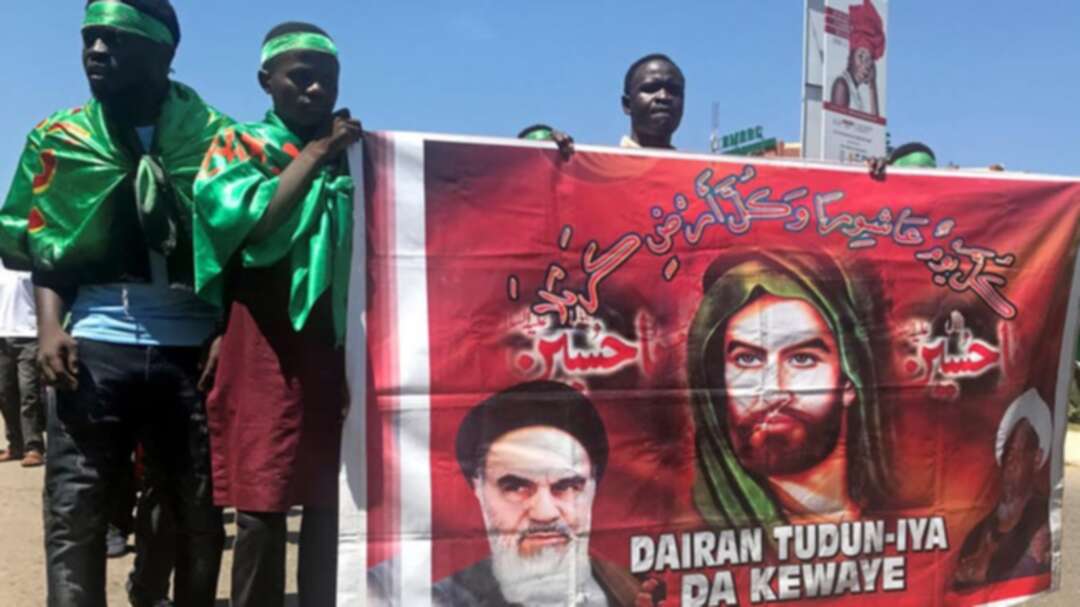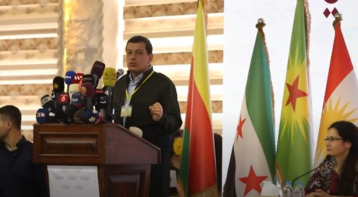-
Iranian-funded Islamic Movement in Nigeria banned amid fears of violence

An Iranian-funded and inspired Shiite organization in Nigeria has been banned and designated as a terrorist organization by the Nigerian government, amid fears that its military-trained members may launch an insurgency.
The Islamic Movement in Nigeria (IMN), which advocates for an Iranian-style republic in Nigeria, is accused of using violence against the state in its campaign to free its founder and leader Sheikh Ibrahim Zakzaky. Zakzaky was granted bail to fly to India for medical treatment on Monday, after being imprisoned in 2015 on accusations of murder, manslaughter, unlawful assembly, and disruption of public peace.
Zakzaky, a Shiite cleric, was arrested in December 2015 after the Nigerian government stormed the IMN’s offices, resulting in approximately 350 deaths. The IMN has since been campaigning for his release, with protests often turning violent.
Iran also campaigned for Zakzaky’s release and continues to provide financial and political support to the INM, which has been described as an Iranian proxy group.
The banning of the group has drawn attention to Iranian influence among the Shiite community in Nigeria, which makes up an estimated five to 17 percent of Nigeria’s 100 million Muslims, amid fears of sectarian conflict erupting as the IMN rejects the authority of Nigeria’s Sunni President Muhammadu Buhari. IMN members have military-level training and could be capable of launching an insurgency against the Nigerian government as the state pursues a policy of repression.
Fears are exacerbated by reports that Iran’s Lebanese proxy Hezbollah has increased its presence in Nigeria and is training local Shiites.
Inspired by Khomeini
The INM, which was founded by Zakzaky in the early 1980s after he visited post-revolution Iran, draws inspiration from Iran’s former Supreme Leader Ruhollah Khomeini.
“The IMN’s foundation in the early 1980s was inspired by Ayatollah Khomeini’s Islamic revolution in Iran and the group has called for the establishment of an Iranian-style Islamic government in Nigeria,” explains David Bruckmeier, Africa intelligence analyst at AKE International.
The IMN’s website is adorned with photographs of Khomeini, alongside the Iranian regime’s slogan “Death to America,” which a senior Iranian official recently claimed should be entered into the Guinness World Records book.
According to the BBC, supporters at IMN gatherings pledge allegiance to Khomeini before pledging allegiance to Zakzaky.
Iranian support
Iran has provided the IMN with financial and political support since its inception.
The exact amount of financial support from Iran is unknown, but experts agree Iran has funded the IMN. According to Bloomberg, the IMN has increased its presence in northern Nigeria as part of “Iran’s drive into western Africa.” The organization has established a network of Shiite seminaries, schools, organizations, and a “martyrs’ foundation,” at least partly funded by Iran.
Other analysts have acknowledged Iran’s support but fallen short of calling the INM a “proxy.” “The IMN has subsisted for years on small handouts from Iran and its leaders often invoked Tehran’s political and ideological rhetoric. However, the IMN is a home-grown oddity with a set of local political demands more than it is some sort of Iranian proxy,” Matthew Page, Associate Fellow with the Africa Program at Chatham House, told Al Arabiya English.
Politically, Iran has expressed its support for the IMN on several occasions. President Rouhani phoned Nigerian President Buhari to protest against the crackdown on the IMN in 2015.
Iran has since directly supported Zakzaky and his family, campaigning for the sheikh’s release.
On August 7, 2018, Iran opened an office for Zakzaky in the Iranian city of Mashhad, according to Iran’s IRIB news agency. The opening was attended by members of Zakzaky’s family as well as Iranian clerics, including Kazem Sedighi, an influential Iranian cleric.
In a letter to the Nigerian judicial authorities on July 20, 2019, Iran’s Attorney-General Mohammad Jafar Montazeri criticized the Nigerian government for its treatment of Zakzaky and requested to have him transferred to Iran for treatment, according to the semi-official Tasnim news agency.
A week later, Iran’s US-sanctioned Foreign Minister Mohammad Javad Zarif “pursued Zakzaky’s situation diplomatically” during a trip to Senegal, according to Iran’s foreign spokesman Abbas Mousavi.
Fears of a sectarian insurgency
The banning of the organization and Iranian involvement have prompted fears of the INM launching an insurgency against the Nigerian government.
“The fact that IMN members receive extensive military training suggests that a change of strategy to armed resistance certainly isn’t a far-fetched scenario if hardliners gain the upper hand. Increased Iranian support would further increase this risk,” Bruckmeier told Al Arabiya English.
The IMN has trained a force of militants tasked with providing security at group meetings and other events, according to Jonathan Hill, professor of International Relations at King’s College London, who wrote in 2010 that the groups were “modelled on the Revolutionary Guards in Iran.”
The Nigerian government is seen as further stoking the fire. “The Nigerian government’s misguided, heavy-handed approach toward the IMN only serves to escalate the conflict and increase the chance it grows into another grassroots insurgency,” said Page.
Hezbollah’s presence in northern Nigeria is also causing insecurity.
In 2013, a Hezbollah armory was discovered in the Nigerian city of Kano. Nigerian police arrested three Lebanese nationals and recovered 1,160 mm anti-tank weapons, four anti-tank landmines, two rounds of ammunition for a 122 mm artillery gun, 21 rocket-propelled grenades, 17 AK-47s with more than 11,000 bullets, and some dynamite.
“It is known that Hezbollah has had a presence in northern Nigeria for several years and that Nigerian Shia have received military training by Hezbollah both in Nigeria and in Lebanon,” said Bruckmeier, adding that the IMN appears to have emulated Hezbollah’s propaganda methods in recent years.
Africa’s most populous country is already embroiled in a 10-year counter-insurgency against terrorist group Boko Haram in which thousands have been killed.
You May Also Like
Popular Posts
Caricature
BENEFIT Sponsors BuildHer...
- April 23, 2025
BENEFIT, the Kingdom’s innovator and leading company in Fintech and electronic financial transactions service, has sponsored the BuildHer CityHack 2025 Hackathon, a two-day event spearheaded by the College of Engineering and Technology at the Royal University for Women (RUW).
Aimed at secondary school students, the event brought together a distinguished group of academic professionals and technology experts to mentor and inspire young participants.
More than 100 high school students from across the Kingdom of Bahrain took part in the hackathon, which featured an intensive programme of training workshops and hands-on sessions. These activities were tailored to enhance participants’ critical thinking, collaborative problem-solving, and team-building capabilities, while also encouraging the development of practical and sustainable solutions to contemporary challenges using modern technological tools.
BENEFIT’s Chief Executive Mr. Abdulwahed AlJanahi, commented: “Our support for this educational hackathon reflects our long-term strategic vision to nurture the talents of emerging national youth and empower the next generation of accomplished female leaders in technology. By fostering creativity and innovation, we aim to contribute meaningfully to Bahrain’s comprehensive development goals and align with the aspirations outlined in the Kingdom’s Vision 2030—an ambition in which BENEFIT plays a central role.”
Professor Riyadh Yousif Hamzah, President of the Royal University for Women, commented: “This initiative reflects our commitment to advancing women in STEM fields. We're cultivating a generation of creative, solution-driven female leaders who will drive national development. Our partnership with BENEFIT exemplifies the powerful synergy between academia and private sector in supporting educational innovation.”
Hanan Abdulla Hasan, Senior Manager, PR & Communication at BENEFIT, said: “We are honoured to collaborate with RUW in supporting this remarkable technology-focused event. It highlights our commitment to social responsibility, and our ongoing efforts to enhance the digital and innovation capabilities of young Bahraini women and foster their ability to harness technological tools in the service of a smarter, more sustainable future.”
For his part, Dr. Humam ElAgha, Acting Dean of the College of Engineering and Technology at the University, said: “BuildHer CityHack 2025 embodies our hands-on approach to education. By tackling real-world problems through creative thinking and sustainable solutions, we're preparing women to thrive in the knowledge economy – a cornerstone of the University's vision.”
opinion
Report
ads
Newsletter
Subscribe to our mailing list to get the new updates!






















